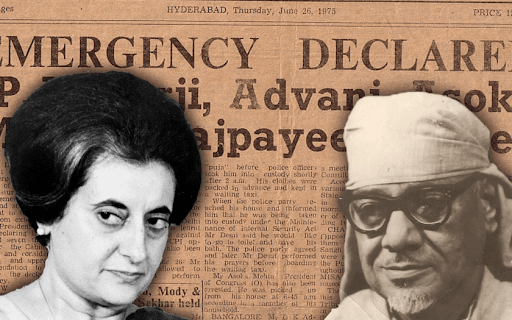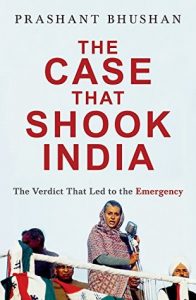Title of the Case: Indira Gandhi v. Raj Narain and Anr.
Citation: 1975 AIR 865, 1975 SCR (3) 333.
Court: Allahabad High Court and Supreme Court of India.
Bench: Justice Jagmohanlal Sinha (HC) and Justice Mathews, Chief Justice Ray, Justice Beg, Justice Khanna and Justice Chandrachud.
Facts:
The case of Indira Gandhi vs. Raj Narain and Anr. was based on straight accusation of the then Prime Minister, Indira Gandhi to be guilty of electoral malpractices. Raj Narain was contesting elections against Indira Gandhi in the constituency of Rai Bareily in 1971 Lok Sabha. Raj Narain contended extravagantly, so much so that he even celebrated before the polling results were out. This sense of confidence turned into a state of shock when he heard of how Mrs. Gandhi was re-elected and Congress won with a sweeping majority. So post-results Raj Narain moved Allahabad High Court and filed a petition for thorough investigation as he accused her of electoral malpractices like-
• Bribery
• Usage of government machinery and utilization of state resources.
• Specifically even about how Gandhi used government employees for her campaigning.
• He even accused Gandhi of procuring assistance of armed forces for arranging her flights by Air Force.
• Her election agent, Yashpal Kapoor and others distributed clothes and liquors, they also appealed to religious symbols of cow and calf.
• They even used government vehicles in order to help voters to get to their polling stations.
• They exceeded the ‘acceptable budget’ in order to contest elections.
In order to prove these allegations, he even called the state govt. of Uttar Pradesh to produce the ‘Blue Book’ – the Blue Book was requested to to be produced in order to understand the security guidelines for protection of Prime Minister while travelling. Responding to this the Home Security of Uttar Pradesh claimed ‘non disclosure privilege’ under Sec.123 of Evidence Act. Although there was no submission of an affidavit from the other party’s side.
Judgement of the High Court
So, the High Court ruled in favor of Raj Narain because the disclosure of the Blue Book could only be prohibited if it was against public interest. The High Court validated all the accusations and charged Gandhi guilty of electoral malpractices under Sec. 123 (7) of Representatives of People’s Act.
Aggrieved by the High Court’s decision, Gandhi appealed to the Supreme Court. However, the Supreme Court then being on vacation granted a conditional stay on the matter on 24th June 1975. Indira Gandhi was allowed to act as a Prime Minister but was restricted from voting in the Parliament. While granting the conditional stay, Supreme Court ordered the parties to appear before it on 11 August, 1975. Interestingly, President Fakhrudden Ali declared a state of ‘emergency’ due to ‘internal disturbances’ now even a common man could interpret why such ‘turn of events’ took place. Following the declaration of emergency, on 10th August 1975, Parliament passed 39th Constitutional Amendment Act by virtue of which the Courts were now restricted from trying the election disputes of President, Prime Minister, Vice President and Speaker of Lok Sabha , rather a committee formed by Parliament would review such matters.
This Amendment Act also put three Acts in the Ninth Schedule-
1) Representation of People Amendment Act, 43 of 1951.
2) Representation of People Amendment Act, 58 of 1974.
3) Election Laws Amendment Act.
Raj Narain challenged the constitutionality of 39th Amendment Act and of the first two abovementioned acts on the basis of ‘Doctrine of Basic Structure’ given in the Kesavanand Bharti Case.
Arguments:
Both the parties argued by whole devotion in this matter. Although the govt.’s move of the sudden pasasage of the amendment was quite obvious. We still analyse both parties contention-
Arguments by Respondents:
Shanti Bhushan, the counsel for Respondents argued the below mentioned points:-
1) The 39th Amendment Act affects the Basic Structure or institutional pattern of the Constitution.
2) The Amendments also takes away the power of jurisdiction of the Courts. The state of our country observed separation of powers between all the three organs of the Government. So, it would be unjust to the judiciary if their powers to resolve are negated or taken away under any circumstance.
3) The function of the Legislature is to necessarily legislate. It can pass laws but it cannot decide the constitutional validity of such laws and if the judiciary finds otherwise, such laws will be stroked.
4) Free and fair elections are the key features in any Democracy. It is absolutely important that if elections are maliciously won, the Judiciary intervenes to provide justice.
5) Art. 14 of our Constitution also guarantees Equality before Law and equal protection of law. The President by passing such law has placed him and the other people above the law and which is not justified.
6) Rule of Law and Judicial Review are basic features of our Constitution, they cannot be damaged or altered as held in The Fundamental Rights Case.
7) Political Justice is recognized by our Preamble, and it cannot be challenged under any circumstance.
8) Even with 2/3rd majority, constituent power cannot exercise executive/judicial power, which in this case it has tried to.
9) Art. 368 does not empower Parliament to amend Constitution so as to decide who wins and who loses an election.
Arguments by Petitioners
The Learned Attorney General contended-
1) Majority decision in the Kesavanand Bharti case is not an authority here to decide if elections would be free and fair without judicial review.
2) Constitution of various countries leave election disputes to judgement of Legislature.
3) Various articles even in our Constitution show judicial review can be excluded in appropriate cases as a matter of policy.
4) How much of elections should be dealt with by Constitution and how much by ordinary legislation is not a matter for courts to decide.
5) If constituent body believes that offices of Prime Minister and Speaker are important enough to be dealt with by the Parliament then it cannot be decided as frivolous.
6) Kesavand Bharti and Shankari Prasad both did not cover the ambit of electoral disputes, they rather dealt with the meaning of word ‘amendment’. Therefore, constituent power must be held as plenary.
7) Article 14 is founded on a sound public policy recognized by all states. Exclusion of Judicial Review does not negate equality by itself. It can be understood as Art 31-B, it denied equality on the face of it, but rather brought economic progress and justice to the country.
8) Exclusion of Judicial Review is permissible anywhere the Constitution did not explicitly state or contemplate for judicial review.
9) Rule of law is not a part of basic structure and apart from Art. 14 our Constitution recognizes neither doctrine of equality nor rule of law.
Judgement
Justice Matthews who originally did not share the view of majority in Kesavanda Bharti stated in this case that “ I proceed with on the assumption that the law as laid down by majority in Fundamental Rights case should govern the decision here, although I did not share the view of majority.”
About the Blue Book he also noted that privilege existed with respect to government document and right to waive such privilege. Court was obligated to examine reasons submitted in the affidavit and it could not decide on such matter without complete inquiry.
Further more, the Court struck down the Amendment on the grounds that it violated the Basic Structure of Constitution.
The judgement is widely noted and cited, it is still considered as a ‘authority’ in courts of law. The judgement upheld and officially put in use what was held in Kesavanand Bharti case and it legitimized the points of rule of law and judicial review in the broad term of ‘Basic Structure’.
Further the Legislature once again tried to hinder the separation of powers by declaring all the amendments completely immune to judicial review under 42nd Amendment but this attempt was also crushed by the judiciary in Minerva Mills case.
Conclusion:
The decision in this must be honored as it totally reminded the greedy parliament its place in the constitution it was again confirmed in the Indian history that Judiciary is there to uphold the Constitution and save Democracy. The court in this case upheld the principle of Separation of Powers which builds checks and balances in the democracy to check that there is no sort of encroachment and overstepping. The Indira Gandhi Govt. was of the view that amidst Emergency the judiciary will also kneel down and abandon its duty to uphold Constitution. However, the Judiciary resolved the crisis and struck down the draconian 39th amendment passed to validate an invalid election.
The court proved that Parliament is by law and it cannot take law in its own hands. Parliament’s recent course to establish its supremacy was ruined by the Judiciary. The court upheld the essence of democracy i.e. Free & Fair election. Indira Gandhi’s malicious attempts to put her Govt.’s legislative power above the Constitution went into drain and the Fundamental Rights Case decision once again proved to be accurate and precise to its core.
NOTE- The readers can also refer to the book written by Prashant Bhushan, the son of counsel in the case, he has explained the entire course of case beautifully even because he was so close to all the events.



